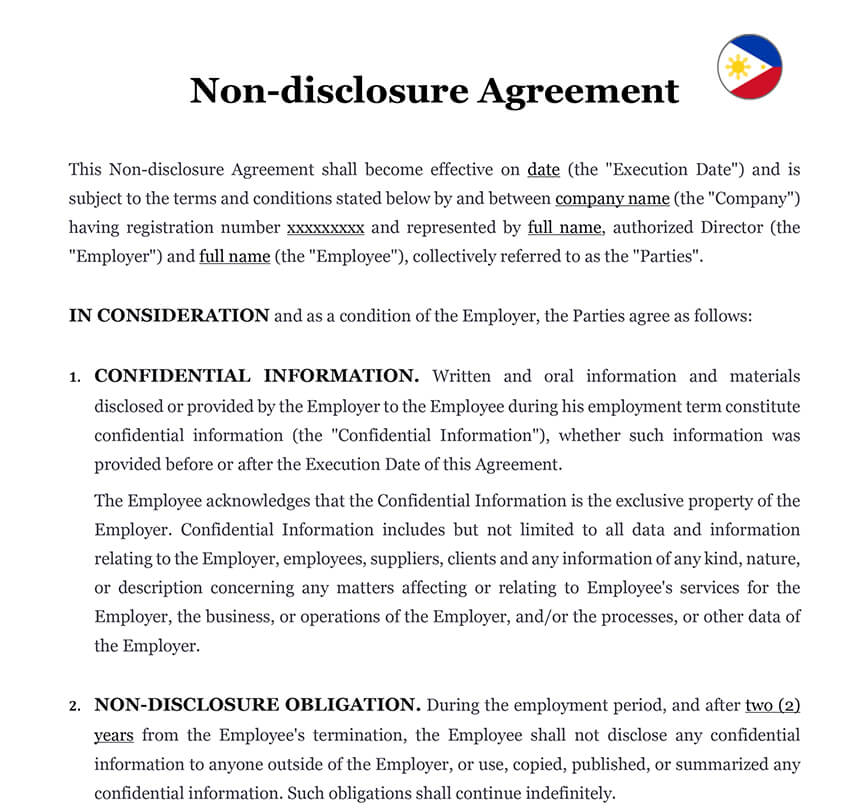Ready to use legal template
Drafted by experienced lawyers
Compliant with Filipino law
Ready to use legal template
Drafted by lawyers
Compliant with Filipino law
Learn more about Employee Confidentiality Agreement in Philippines
Using an Employment Confidentiality Agreement in the Philippines is important for protecting a company’s trade secrets, proprietary information, and Intellectual Property from unauthorized disclosure. It can help prevent employees from using confidential information to gain a competitive advantage or to benefit a competing business. Confidentiality agreements can also help build trust between employers and employees by ensuring that sensitive information remains confidential. Additionally, confidentiality agreements are often required by investors, partners, and customers as a condition for doing business, so having one in place can help companies build and maintain important relationships.
Table of contents
-
What is an Employee Confidentiality Agreement?
-
Why using an Employment Confidentiality Agreement is important?
-
What are the legal considerations for NDA in the Philippines?
-
How to write a Non-Disclosure agreement for your employee?
-
What does a Confidentiality Agreement cover?
-
What are the consequences of breaching confidentiality agreements in the Philippines?
-
How employment confidentiality agreements can safeguard intellectual property?
What is an Employee Confidentiality Agreement?
An Employment Confidentiality Agreement is a legal contract between an employer and an employee in the Philippines that aims to protect the employer’s confidential information from being disclosed to unauthorized parties. This agreement typically covers a wide range of confidential information, including trade secrets, proprietary information, financial data, and customer lists.
Under this agreement, the employee agrees not to disclose any confidential information to third parties, including competitors, during and after their employment. The agreement may also include provisions that restrict the employee from using the confidential information for personal gain or for the benefit of others.
Employment Confidentiality Agreements are generally used to protect the Intellectual Property and trade secrets of the employer. This can include, for example, customer lists, business strategies, product designs, and manufacturing processes. In the event that an employee breaches the confidentiality agreement, the employer can seek legal remedies, such as injunctive relief, damages, or both.
It’s important to note that Employment Confidentiality Agreements in the Philippines must comply with the country’s Labor Laws, particularly on the employee’s right to privacy and freedom of expression. Employers must ensure that the terms of the agreement are reasonable, clear, and not overly restrictive, and that employees fully understand what they are agreeing to before signing the agreement.
Why using an Employment Confidentiality Agreement is important?
1. Protecting Trade Secrets
Confidentiality agreements help protect the trade secrets and proprietary information of a company. These may include customer lists, pricing strategies, product designs, and other sensitive information that gives a business a competitive advantage. By requiring employees to sign a confidentiality agreement, a company can ensure that their confidential information remains confidential and does not fall into the hands of competitors.
2. Preventing Disclosure of Sensitive Information
In some cases, employees may have access to sensitive information that, if disclosed, could harm a company’s reputation or even put it out of business. By requiring employees to sign a confidentiality agreement, a company can limit the risk of this information being disclosed to the public or unauthorized parties.
3. Protecting Intellectual Property
Confidentiality agreements can help protect a company’s intellectual property, including Trademarks, Copyrights, and Patents. This is particularly important for companies that rely heavily on their Intellectual Property, such as technology firms or creative businesses.
4. Legal Protection
By having a confidentiality agreement in place, a company can take legal action against employees who violate the agreement. This can include seeking damages or injunctive relief to prevent further disclosure of confidential information.
What are the legal considerations for NDA in the Philippines?
There are several legal considerations that should be taken into account when drafting an Employment Confidentiality Agreement in the Philippines. These include:
| ➤ Compliance with Labor Laws: Confidentiality agreements must comply with Philippine labor laws. This means that the terms of the agreement must be reasonable, not overly restrictive, and not in violation of an employee's rights to privacy and freedom of expression. It is also important to ensure that the agreement does not prevent an employee from engaging in any lawful profession or trade. |
| ➤ Clarity and Specificity: The confidentiality agreement should be clear and specific in defining what information is considered confidential, and what actions are prohibited. This will help ensure that employees fully understand their obligations under the agreement and what is expected of them. |
| ➤ Consideration: A confidentiality agreement is a binding contract, and as such, it must be supported by consideration. Consideration refers to the benefit that the employee receives in exchange for signing the agreement. In most cases, the employee's continued employment is considered sufficient consideration. |
| ➤ Enforceability: Confidentiality agreements must be enforceable in court. This means that the terms of the agreement should not be overly broad or vague, and the agreement should be reasonable in scope and duration. |
| ➤ Confidentiality Obligations after Employment: Confidentiality obligations may continue after an employee's employment has ended. However, the agreement should specify the duration of the post-employment obligations, which should be reasonable and not unduly restrictive. |
| ➤ Proper Execution: Finally, the confidentiality agreement should be properly executed. This means that the agreement should be signed by both the employer and the employee, and the employee should be given sufficient time to review and understand the terms of the agreement before signing. |




